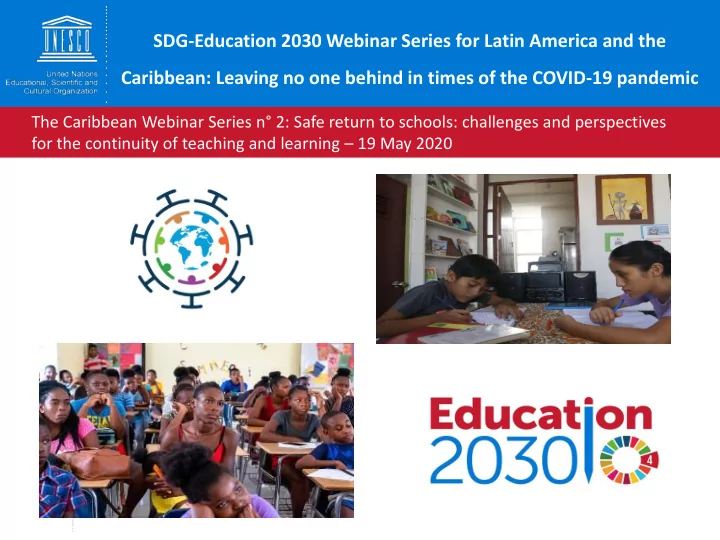

SDG-Education 2030 Webinar Series for Latin America and the Caribbean: Leaving no one behind in times of the COVID-19 pandemic The Caribbean Webinar Series n° 2: Safe return to schools: challenges and perspectives for the continuity of teaching and learning – 19 May 2020
Good Practices from the Globe • Denmark • China • Mexico • Sierra Leone (Ebola experience) • Lessons learned The Caribbean Webinar Series n° 2: Safe return to schools: challenges and perspectives for the continuity of teaching and learning
Good Practice - Denmark When : • Closing: 16 March Reopening: 15 April Who: • Daycare, public schools grade 0 to 5 and special education institutes; • Last year of high school, after school programmes and selected TVET. How: GUIDELINES The health authorities • Distance between seats in classrooms have developed a range Ministry of Children and (at least two meters). of support tools (films, Education: • Hand washing at least every second inspirational material for • Guidelines for hour. activities outside, reopening were • Frequent cleaning including toys and posters, letters) and a published on 13 April: electronic devices. hotline. • • Hotline for general Physical contact such as handshaking and hugging should be avoided. queries and a Q&A • Split children into smaller groups, and website; ensure socialization with as few others No schools or institutions • Counselling on the as possible – including playtime and open until they can meet actual implementation. breaks. health requirements. • No sharing of food . The Caribbean Webinar Series n° 2: Safe return to schools: challenges and perspectives for the continuity of teaching and learning
Good Practice: China When: • Closing: mid January Reopening: starting April Who: • Grade 9 & 12 students • 107 million students already back to school (39%); • By end of May, 150-200 million students anticipated. How: Government ensures the Schools reduce student supplies of sanitizing density: distancing within equipment in schools classroom, shifts of Teachers monitor and (masks, disinfectant students (blended learning), evaluate distance alcohol, gloves etc). arranging breaks and meals learning results, and on different paces, and adjust teaching plans CDC prepared monitoring the accordingly. educational materials on temperature of students COVID-19 prevention as and education personnel the “first class” back to on daily basis. school. The Caribbean Webinar Series n° 2: Safe return to schools: challenges and perspectives for the continuity of teaching and learning
Good Practice: Mexico When: • Closing: 20 March • Regional reopening: mid May • National reopening: 1 June How: Source: NoticiasporelMundo Academic and curricular work (the first six weeks upon return): • Teachers revise students’ Assessment and Social-emotional project homework and distance Evaluation: (the first week upon return) : education portfolios. • Flexible and prioritize • • Teachers discuss with Based on the diagnoses, teachers students’ wellbeing students about how the prepare a learning recovery plan • Aiming to ensure that pandemic was to ensure expected results are fundamental learning experienced, what comes achieved by all students. takes place and the • next, and how can the The Ministry of Public Education successful completion school support students. will deliver special trainings for the school year. teachers on developing the recovery plan. The Caribbean Webinar Series n° 2: Safe return to schools: challenges and perspectives for the continuity of teaching and learning
Good Practice: Sierra Leone (Ebola experience) When: • Closing: August 2014 Reopening: April 2015 How: Crisis Responding Task Force: • Ministry of Education, development partners, NGOs • Distance learning, social mobilization, teacher training Source: UN Photo • Mobilizing resources • Issuing specific health guidelines and protocols to ensure the safety and • Providing hygiene kits. security of students and teachers. • Cleaning and disinfecting schools • Raising awareness among communities on prior to reopening. school reopening through strong social • Encouraging hand washing and mobilization, which helped significantly to monitoring students’ temperature. reduce dropout. • Training teachers on psychosocial • Waiving school fees for all pupils to ease support (at least two teachers in each financial burden of parents and caregivers. school). • Providing school meals for all primary • Readjusting the academic year. school pupils, and teaching and learning materials. The Caribbean Webinar Series n° 2: Safe return to schools: challenges and perspectives for the continuity of teaching and learning
Learning Lessons from the Good Practices So Far • Planning together: Coordination and consultation led by the Ministry of Education with different parties: health authorities, development partners, parents and teachers, as well as the public. • Preparing well: Guidelines, support resources (hygiene kits, learning and teaching materials, school meals, etc.), and COVID-19 mock drill. • Implementing and enforcing health, hygiene and sanitation measures: disinfecting schools, hand-washing, body temperature monitoring… • Resuming learning gradually and creatively • Distancing of pupils: smaller class and activity groups, avoid touching each other and sharing of food, shifts of learning; • Adjustment to curriculum delivery and assessment: assessing distance learning results, adjusting curriculum plans, examinations and school year, psychosocial support, etc. • Blended learning: combination of distance learning and face-to-face learning. The Caribbean Webinar Series n° 2: Safe return to schools: challenges and perspectives for the continuity of teaching and learning
https://en.unesco.org/fieldoffice /santiago/covid-19-education-alc Thank you! UNESCO Date Event / Name / other
Recommend
More recommend